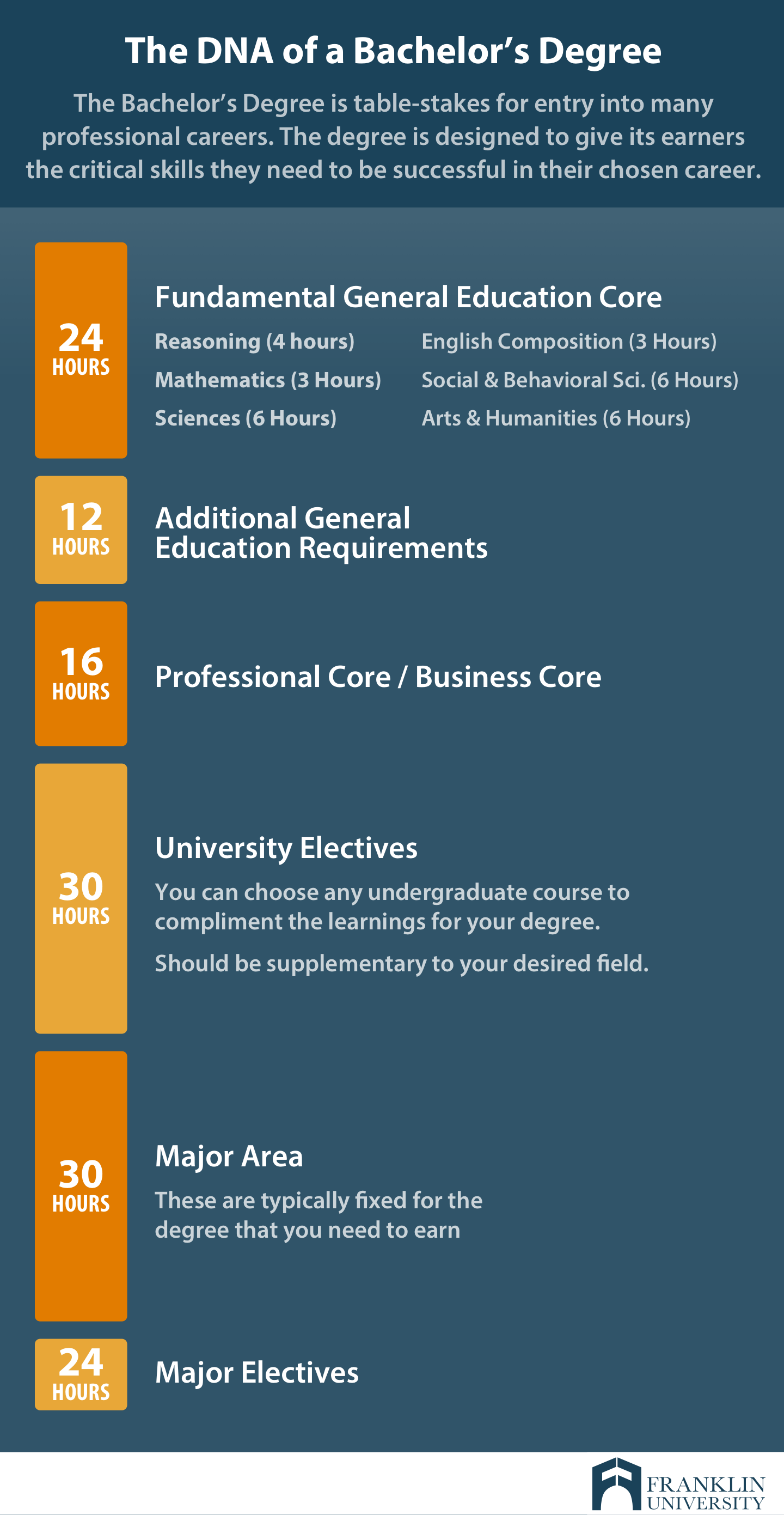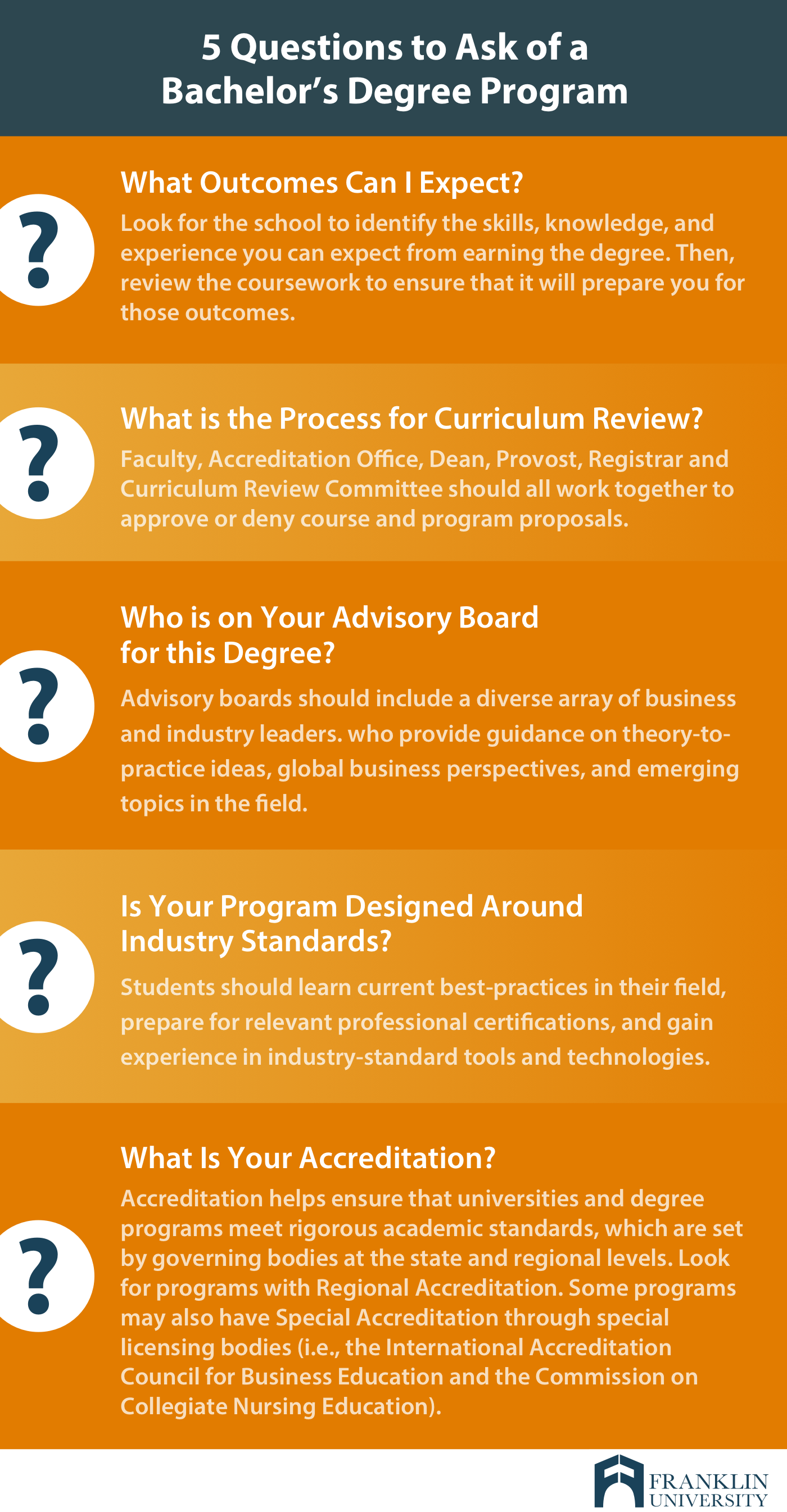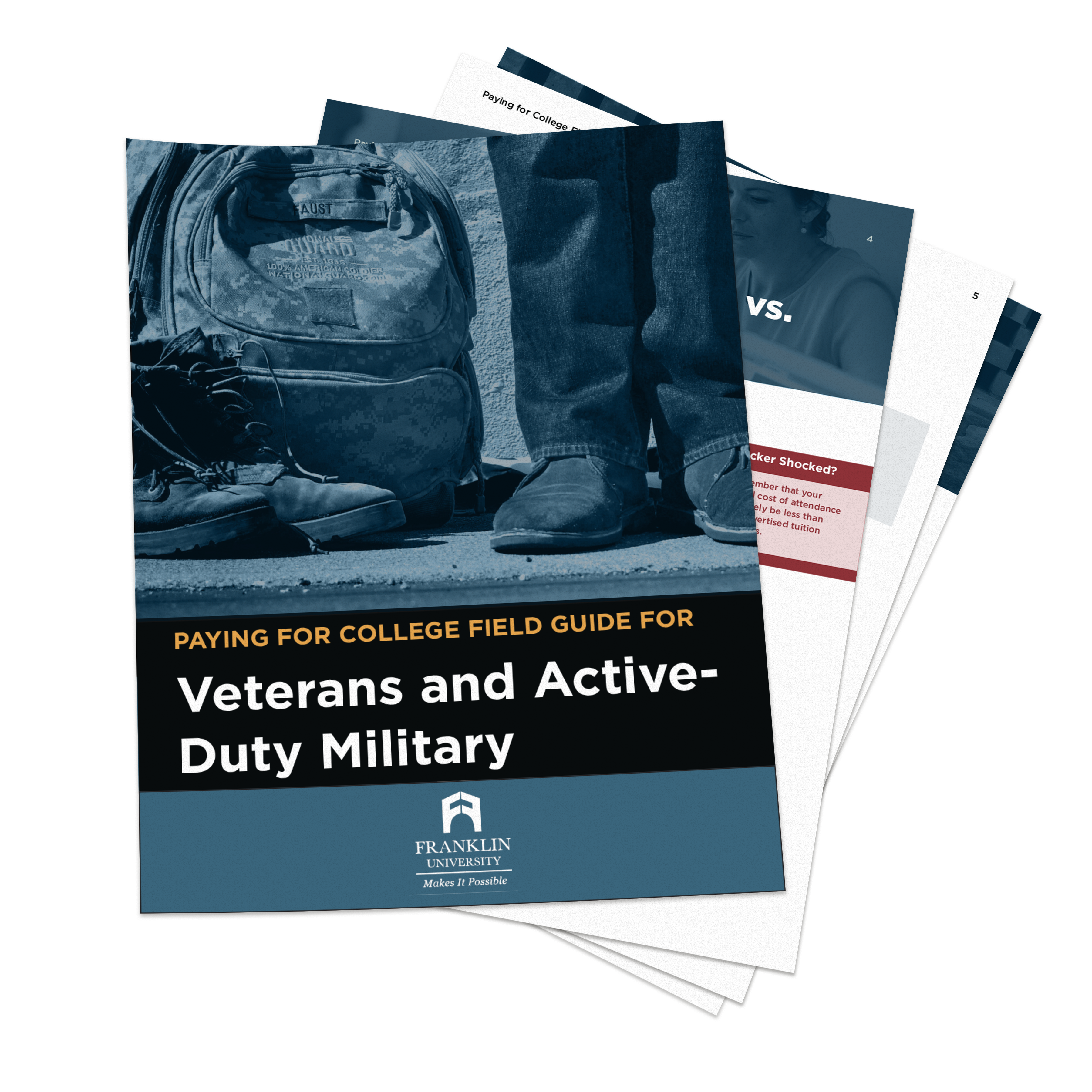Request Information
We're Sorry
There was an unexpected error with the form (your web browser was unable to retrieve some required data from our servers). This kind of error may occur if you have temporarily lost your internet connection. If you're able to verify that your internet connection is stable and the error persists, the Franklin University Help Desk is available to assist you at helpdesk@franklin.edu, 614.947.6682 (local), or 1.866.435.7006 (toll free).
Just a moment while we process your submission.

What Is a Bachelor’s Degree?
If you’re an upward-minded professional or an adult who wants to launch in a new direction, you may be considering a bachelor’s degree. But do you really know what a bachelor’s degree is and what it entails?
As you research your educational options, you may have noticed a wide variety of diplomas available at online and for-profit schools. A bachelor's degree is more than a piece of paper with your name on it. We’ll provide some key information and show you what to look for to make sure you’re getting a quality bachelor’s degree from a reputable institution.
A Bachelor’s Degree Means Rigorous Standards
A true bachelor-conferring institution is able to meet the proper use of standard topics, efforts, comprehensiveness, and complexity within their programs.
Graduates of these programs should be similarly educated and similarly well qualified for their chosen field. The standardization covers a variety of areas, which protects the school, the student, and the future employer against the problems of a less-than-qualified education.
Let's talk about the standardization and how it works for you.
Standardized Structure
Bachelor's degrees typically fall into two main categories of Bachelor of Arts (BA) and Bachelor of Science (BS). Other bachelor's degrees that may be conferred include more highly specified areas of study, such as Bachelor of Business Administration (BBA) and Bachelor of Fine Arts (BFA).
- Bachelor of Arts. Takes a focus on the fields of the humanities and social science, like communication or public relations. Takes a general approach and allows some customization for subjects outside your field of study.
- Bachelor of Science. Focuses on scientific and technical fields; a common choice for engineering, computer science, and advanced nursing degrees. Very concentrated and lets you hit the ground running in your specialized field.
- Bachelor of Business Administration. Covers fields like financial management or management and leadership.
- Bachelor of Fine Arts. Might cover degrees in topics like interior design, art education, graphic design, or art direction.
Standardized Hours of Effort and Duration
You'll see bachelor's degrees across the country with total coursework requirements of around 120-124 semester hours. Since most courses are around 3 hours of credit, that works out to about 40 courses. Prerequisites typically include a high school diploma or GED and the school's approval of your application.
Standardized Course Elements
A bachelor's degree is divided into multiple areas of study—this includes basic core classes, detailed degree-specific content, and elective coursework to round out your education. The breakdown might look something like this:

Heading back to school? Don't leave without downloading our free field guide full of tips to your maximize your military or veteran benefits.
Standardized Time Commitment
Lastly, a bachelor's degree has a typical length of study that you can expect.
If you are returning to school after achieving an associate degree, some of those credits are likely to apply toward your bachelor's degree and you may be able to finish in less time, perhaps 2 or 3 years. If you're starting your studies from scratch, a bachelor's might take 4-6 years, depending on how many courses you can take at a time and how many hours you have to dedicate to your studies vs work and/or family time.
TIP: If you plan ahead, you can use "stepping stones" to achieve your degree goals. Consider understanding the requirements to get an associate degree and get those achieved first. Then if your educational years are interrupted, at least you will have a degree to show for your efforts. If you are able to continue without interruption, you will have your associate during the final years as you finish your bachelor's degree; perhaps it will help you improve your pay level or working situation during those years.
What Makes a Good Bachelor's Degree Program?
A bachelor's degree is only as good as the effort the educational institution puts behind it. You'll feel good to know that—at the best schools—professionals with industry ties are constantly evaluating the curricula, the relevance of coursework, and the effectiveness of its delivery.
As you choose a school, you should be curious and informed about how the institution develops, modernizes, and maintains its programs.
Consider asking about these five questions of a bachelor's degree program:

TIP: Program reputation is another important element of what makes a good program. Reputation lives everywhere today, in a world of instant sharing and online presence. It's easier than ever to get a well-rounded view of a school's reputation, in places like Online Degree Reviews, US News Best Colleges, and even on the school's own websites and chat boards.
What Traits Will I Need to Earn a My Degree?
Now that you've looked critically at schools and their programs, it's time to turn the focus back on yourself. Before you make your commitment to a particular school and begin your studies, take a self-assessment of the resilience and preparedness that you'll soon need. Here are some of the traits that will help you on your academic journey:
- Independence - You'll need to be self-starting on every element of your education. This affects how you choose your classes and attend them, how you handle your homework and study, and how you take on additional research. TIP: Independence extends into how you interact with your educators. Reach out with active questions; schedule an office visit if you need it. It's important to be an interactive and proactive part of your own education.
- Desire/Motivation - A long-term educational goal can be a grind. You must have the desire to remain committed, even in the face of adversity and setbacks. When things get challenging, remember that your current struggles can be useful to you with future employers; you can use your challenges as stories to show how you've overcome hurdles to gain success. Employers love stories like that.
- Humility - Ask yourself if you have a true desire to learn and observe; be ready to tap into that. An obvious (but difficult-to-admit) element is to realize that you don’t know everything. You will do well to listen, partner, share, and always be open to instruction and advice.
- Analytical Thinking - Your bachelor's education will provide you with many opportunities to stretch your mind and be more openly analytical. You'll need to focus on ways to internalize information and apply it in different ways. Your degree will be about more than just retaining information but also using it with excitement, creativity and practicality.
- Commitment - Above all, earning your bachelor's may test your ability to commit to a long-term goal of a degree that will change the course of your professional career. Know now that you will be challenged multiple times in the future. As a result, you'll need to regularly show your dedication to stick with it as you earn your next major educational achievement.
Why People Choose to Earn a Bachelor’s Degree
Earning a bachelor’s degree is a personal and professional decision that can ignite a powerful change in your life and inside of you. There are many reasons to consider going back to school for a degree:
- Changing careers
- Self-development/personal enrichment
- Increased job opportunity
- Career advancement or qualifying for a promotion
- Additional earning power
The best part is that a bachelor’s degree is something that, once earned, stays with you for life.
Start Now to Find Your Match
Now that you know the makings of a good bachelor's degree institution and curricula, it's time to put your search into high gear. Start now to find the best program that suits you, inspires you, and supports you—and don't settle for less.





